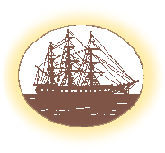| |
 |

Note: This lesson relates to "The Loser Who Would Not Give Up"
| |
Historical Background on USS Constitution
 USS Constitution is the oldest commissioned warship afloat in the world. Carrying a crew of 450 men and over 50 guns, she was launched in 1797 to protect America's freedom on the seas. She was undefeated against the British in the War of 1812 and earned the nickname "Old Ironsides" when a sailor saw a cannon ball bounce off her thick, wooden hull during battle. When she was declared unseaworthy in 1828, she was saved by the American people who rallied for her preservation. After a long career, including capturing a slave ship, circumventing the globe, and serving as a military prison, she is now berthed in Boston and is open to the public. For more information, go to www.allhandsondeck.org, www.ussconstitutionmuseum.org, and www.ussconstitution.navy.mil. USS Constitution is the oldest commissioned warship afloat in the world. Carrying a crew of 450 men and over 50 guns, she was launched in 1797 to protect America's freedom on the seas. She was undefeated against the British in the War of 1812 and earned the nickname "Old Ironsides" when a sailor saw a cannon ball bounce off her thick, wooden hull during battle. When she was declared unseaworthy in 1828, she was saved by the American people who rallied for her preservation. After a long career, including capturing a slave ship, circumventing the globe, and serving as a military prison, she is now berthed in Boston and is open to the public. For more information, go to www.allhandsondeck.org, www.ussconstitutionmuseum.org, and www.ussconstitution.navy.mil.
|
|
| |
|
|
|
|
Objectives
After completing this lesson, students will be able to: |
| |
1. |
Use a table to identify who served the most amount of time (including identification of leap years) as commander of USS Constitution between 1798–1846. |
| |
2. |
Use a table to identify who served the least amount of time (including identification of leap years) as commander of USS Constitution between 1798–1846. |
|
Massachusetts Math Curriculum Frameworks
Grade 4 Learning Standards: Data Analysis, Statistics and Probability; Measurement
Students engage in problem solving, communicating, reasoning, connecting, and representing as they: |
| |
• |
4.D.1 Collect and organize data using observations, measurements, surveys, or experiments, and identify appropriate ways to display the data. |
| |
• |
4.D.2 Match representations of a data set such as lists, tables, or graphs (including circle graphs) with the actual set of data. |
| |
• |
4.D.3 Construct, draw conclusions, and make predictions from various representations of data sets, including tables, bar graphs, pictographs, line graphs, line plots and tallies. |
| |
• |
4.M.4 Carry out simple unit conversions within a system of measurement (e.g., hours to minutes, cents to dollars, yards to feet or inches). |
| |
• |
4.M.3 Identify time to the minute on analog and digital clocks using a.m. and p.m. Compute elapsed time using a clock (e.g., hours and minutes since…) and using a calendar (e.g., days since…). |
| |
• |
4.N.10 Select and use appropriate operations (addition, subtraction, multiplication, and division) to solve problems, including those involving money. |
| |
• |
4.P.4 Use pictures, models, tables, charts, graphs, words, number sentences, and mathematical notations to interpret mathematical relationships. |
|
Rubric for Evaluation and Analysis
Objective: The student will display knowledge of the necessary mathematical reasoning skills to correctly solve math problems involving data analysis and the measurement of elapsed time related to the study of the USS Constitution. |
| |
3 |
The student displays knowledge of the necessary mathematical reasoning skills by solving the problem with the correct (appropriate) answer. |
| |
2 |
The student displays knowledge of the necessary mathematical reasoning skills but solves the problem with an incorrect (inappropriate) answer. |
| |
1 |
The student attempts to solve the problem but is unable to display the knowledge of the necessary mathematical reasoning skills. |
| |
0 |
The student does not attempt to solve the problem. |
|

to top
|
 |




 USS Constitution is the oldest commissioned warship afloat in the world. Carrying a crew of 450 men and over 50 guns, she was launched in 1797 to protect America's freedom on the seas. She was undefeated against the British in the War of 1812 and earned the nickname "Old Ironsides" when a sailor saw a cannon ball bounce off her thick, wooden hull during battle. When she was declared unseaworthy in 1828, she was saved by the American people who rallied for her preservation. After a long career, including capturing a slave ship, circumventing the globe, and serving as a military prison, she is now berthed in Boston and is open to the public. For more information, go to www.allhandsondeck.org, www.ussconstitutionmuseum.org, and www.ussconstitution.navy.mil.
USS Constitution is the oldest commissioned warship afloat in the world. Carrying a crew of 450 men and over 50 guns, she was launched in 1797 to protect America's freedom on the seas. She was undefeated against the British in the War of 1812 and earned the nickname "Old Ironsides" when a sailor saw a cannon ball bounce off her thick, wooden hull during battle. When she was declared unseaworthy in 1828, she was saved by the American people who rallied for her preservation. After a long career, including capturing a slave ship, circumventing the globe, and serving as a military prison, she is now berthed in Boston and is open to the public. For more information, go to www.allhandsondeck.org, www.ussconstitutionmuseum.org, and www.ussconstitution.navy.mil. 